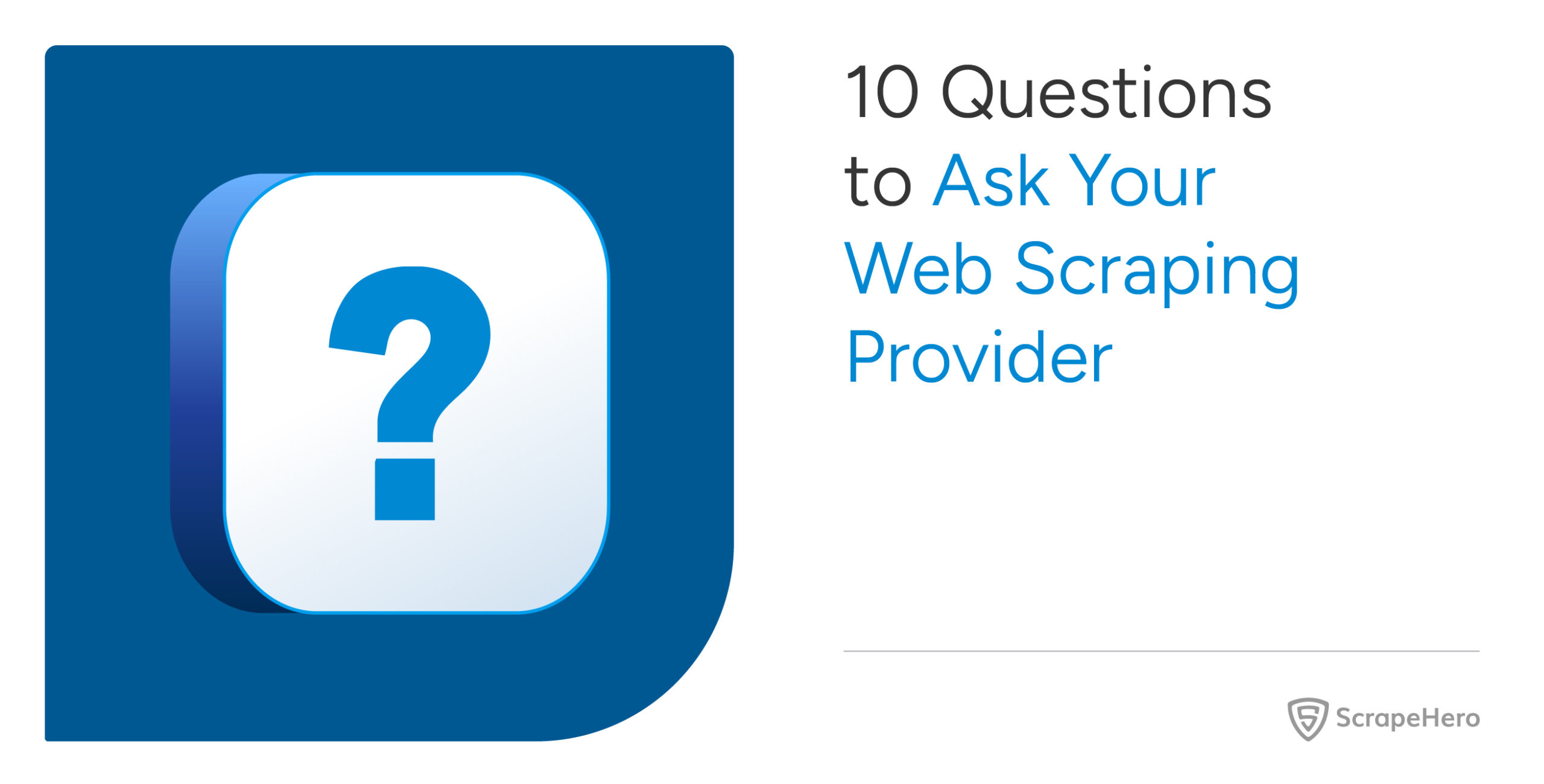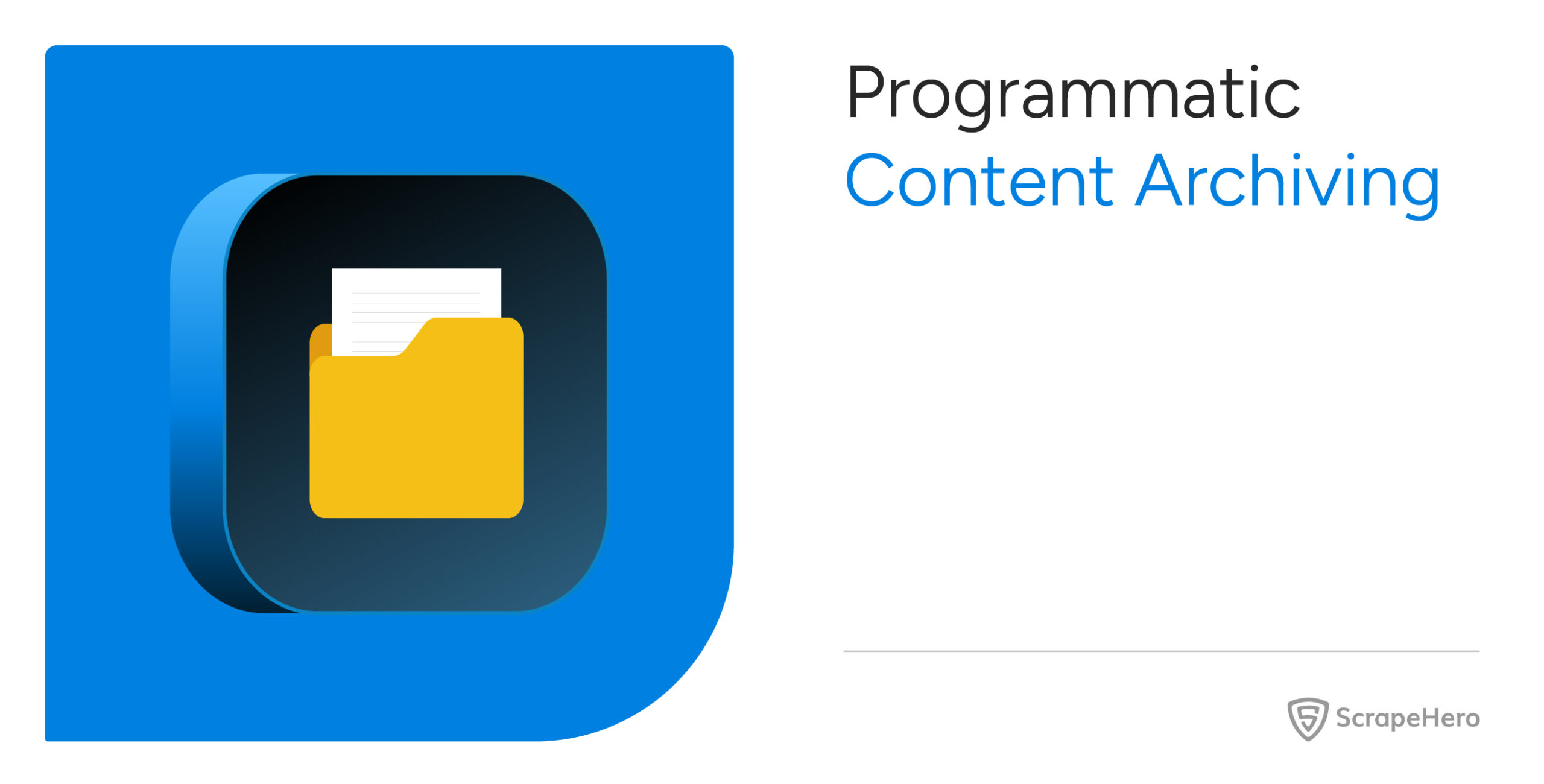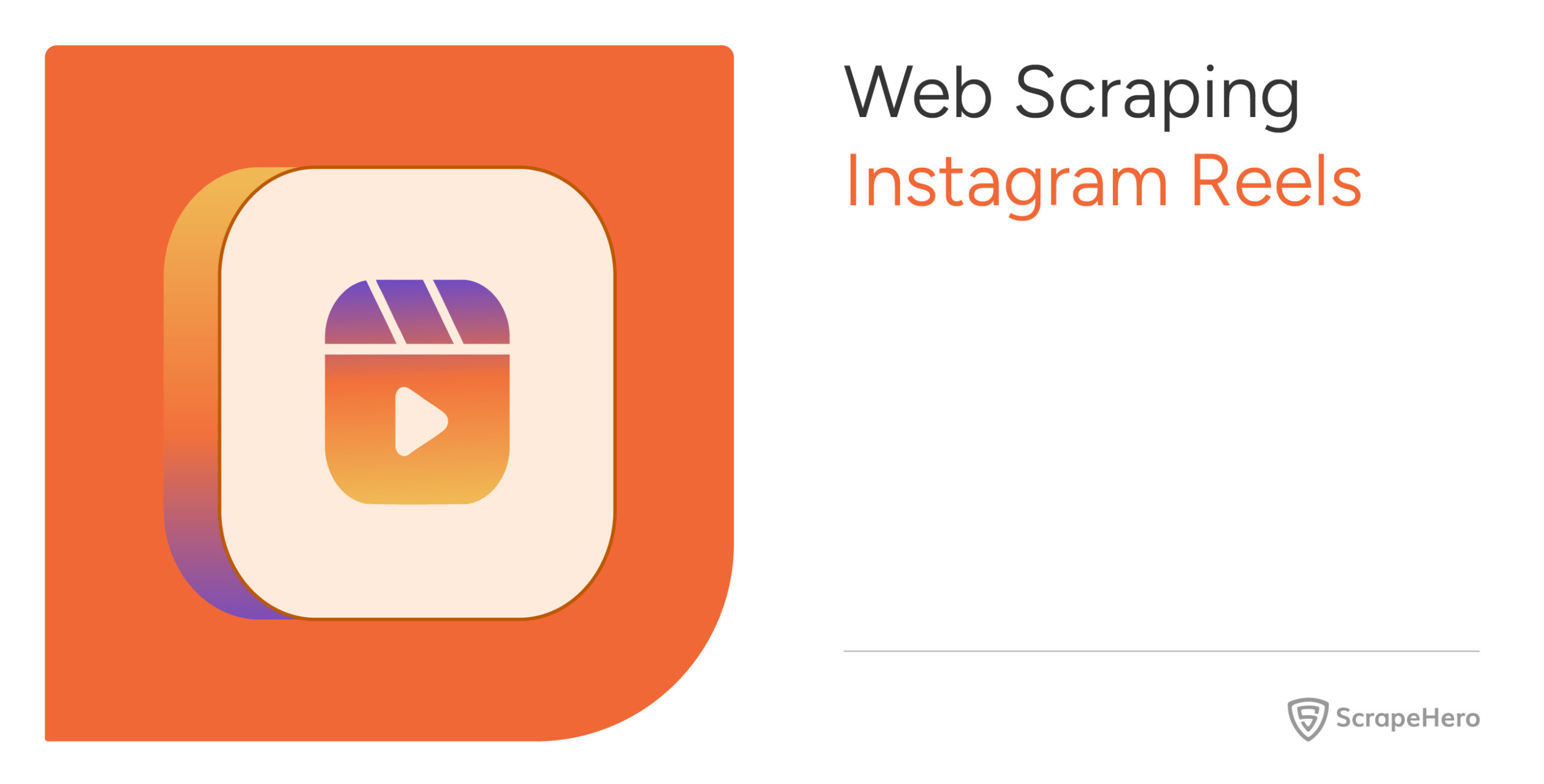You just saved $10,000 by choosing the cheapest web scraping provider.
But, after six months, you face poor data quality, frequent system crashes, and compliance issues that could have been avoided. These issues can lead to incorrect business decisions, wasted time and money, and even legal consequences. This scenario plays out more often than most companies realize.
Why?.
Professional web scraping involves complex technical infrastructure, legal compliance frameworks, quality assurance processes, and ongoing maintenance. When these elements are handled poorly, the savings from a cheap provider quickly turn into expensive problems.
So, what’s the fix?.
The solution goes beyond just asking for a price. It’s about asking the right questions about web scraping to uncover a provider’s true abilities and trustworthiness. This guide covers 10 key questions to ask a web scraping service provider that help you find providers that offer reliable, high-quality data services while avoiding the common mistakes.
Why worry about expensive infrastructure, resource allocation and complex websites when ScrapeHero can scrape for you at a fraction of the cost?Go the hassle-free route with ScrapeHero
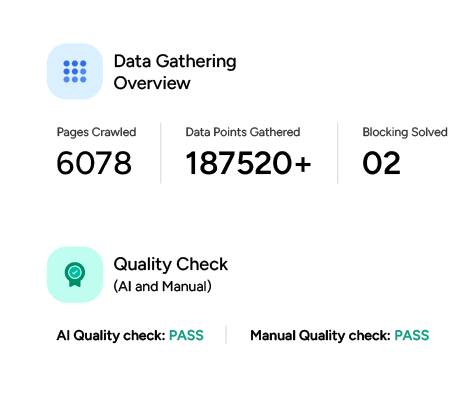
What Questions Should You Ask a Web Scraping Provider?
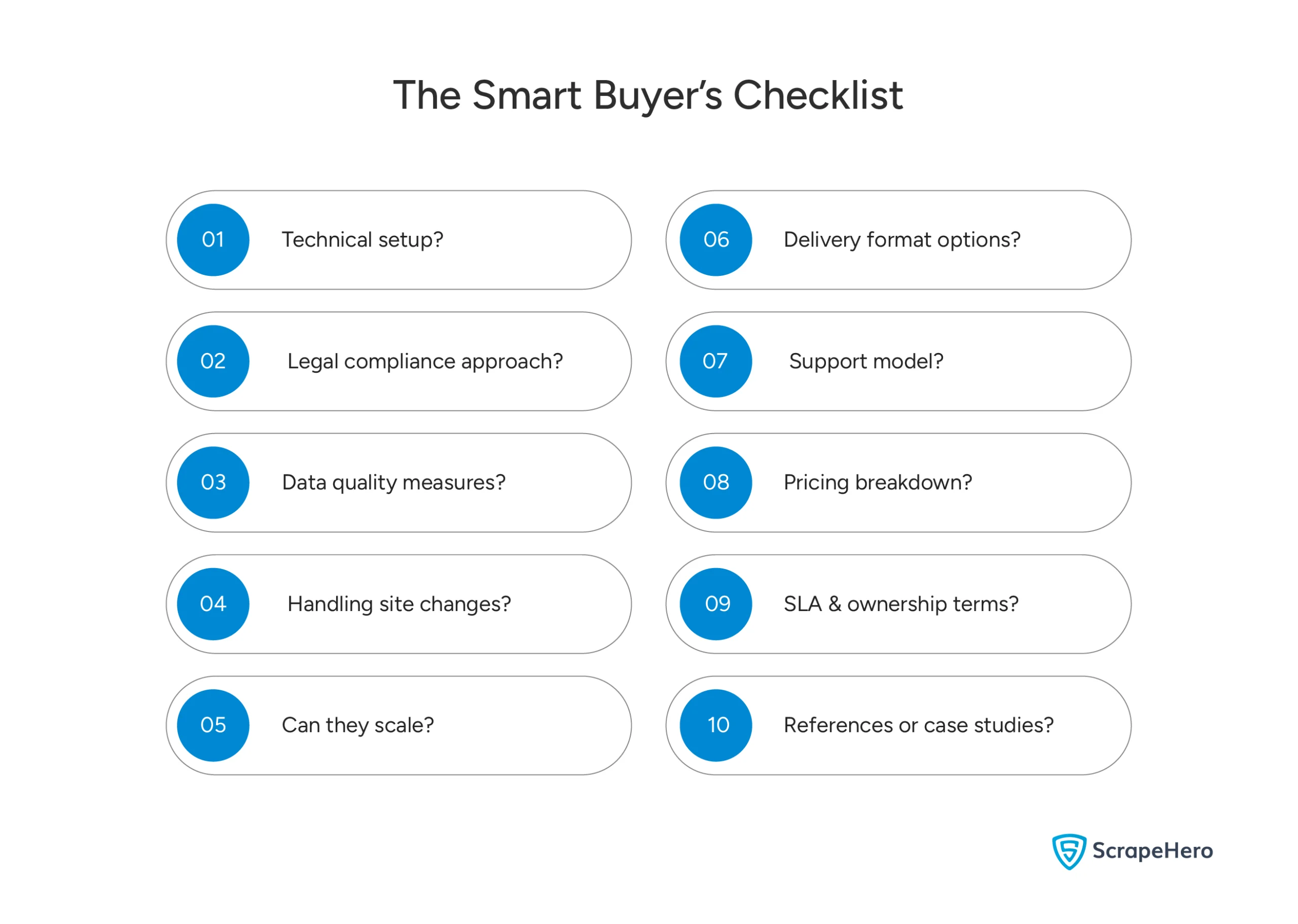
Q1: Can You Describe Your Technical Architecture and Infrastructure?
Why This Question Is Crucial
Your provider’s technical setup has a direct impact on data quality and reliability. A simple script on one server won’t handle modern websites with anti-bot protection. So, you need a provider with a professional infrastructure that can scale and adapt.
This is one of the first questions to ask web scraping companies before you sign a deal.
What to Listen For
Look for providers who mention:
- Multiple servers working together (distributed crawling)
- Smart proxy management with different IP types
- Headless browsers for JavaScript-heavy sites
- Cloud-based systems that can grow with your needs
- Backup systems in case something fails
Red Flags
Avoid providers who:
- Can’t explain their technical setup clearly
- Relies on third-party scraping tools
- Only use basic tools like simple HTTP requests
- Don’t mention proxies or JavaScript handling
- Seems vague about their infrastructure
Q2: What Is Your Approach to Legal and Ethical Compliance?
Why This Question is Crucial
Your questions to ask web scraping providers must include legal compliance. Poor compliance can expose your company to lawsuits, fines, and reputation damage. Data privacy laws like GDPR make this even more critical.
What to Listen For
Professional providers will:
- Acknowledge they’re not lawyers but follow best practices
- Respect robots.txt files and terms of service
- Only scrape publicly available data
- Understand data privacy laws (GDPR, CCPA)
- Practice ethical scraping with reasonable request rates
Red Flags
Be wary of providers who:
- Dismiss legal concerns as unimportant
- Claim they can scrape any website without limits
- Don’t know about data privacy regulations
- Have no clear compliance policies
Q3: How Do You Ensure Data Quality, Accuracy, and Completeness?
Why This Question is Crucial
Bad data is worse than no data. It leads to incorrect business decisions, resulting in wasted time and money. Therefore, your questions on web scraping should always cover quality control processes.
What to Listen For
Top providers will describe:
- Automated checks that validate data as it’s collected
- Data cleaning to remove errors and format inconsistencies
- Human review for complex projects
- Clear reporting when data is missing or incomplete
- Systems to track where each piece of data came from
Red Flags
Avoid providers who:
- Simply deliver raw data without cleaning
- Claim their systems are 100% perfect
- Can’t give specific examples of quality checks
- Make data quality entirely your responsibility
Q4: How Do You Handle Anti-Scraping Measures and Website Structural Changes?
Why This Question is Crucial
Websites constantly change and actively try to block scrapers. A provider who sets up scrapers and walks away will leave you with broken data collection within weeks or months.
What to Listen For
Experienced providers will mention:
- Automated monitoring of scraper performance
- Quick alerts when scrapers break or slow down
- Engineering teams are ready to fix issues fast
- Scrapers built to handle minor website changes
- Version control for their scraper code
Red Flags
Watch out for providers who:
- Claim website changes aren’t usually a problem
- Only fix issues after you report them
- Have no clear maintenance plan
- Want to charge extra for every minor fix
Q5: What Are Your Capabilities Regarding Scale, Speed, and Scheduling?
Why This Question is Crucial
Your data needs will grow over time. So, ask your web scraping service provider if they can handle more data and deliver it faster as your business grows.
What to Listen For
Scalable providers will discuss:
- How do they add more servers to handle bigger projects
- Realistic speed estimates that balance fast delivery with staying undetected
- Flexible scheduling options (daily, hourly, real-time)
- Experience with large-scale data projects
- Cloud infrastructure that can grow quickly
Red Flags
Be concerned about providers who:
- Can’t give clear numbers about their capacity
- Offer only rigid scheduling options
- Focus only on speed without considering detection risks
- Have no experience with projects of your size
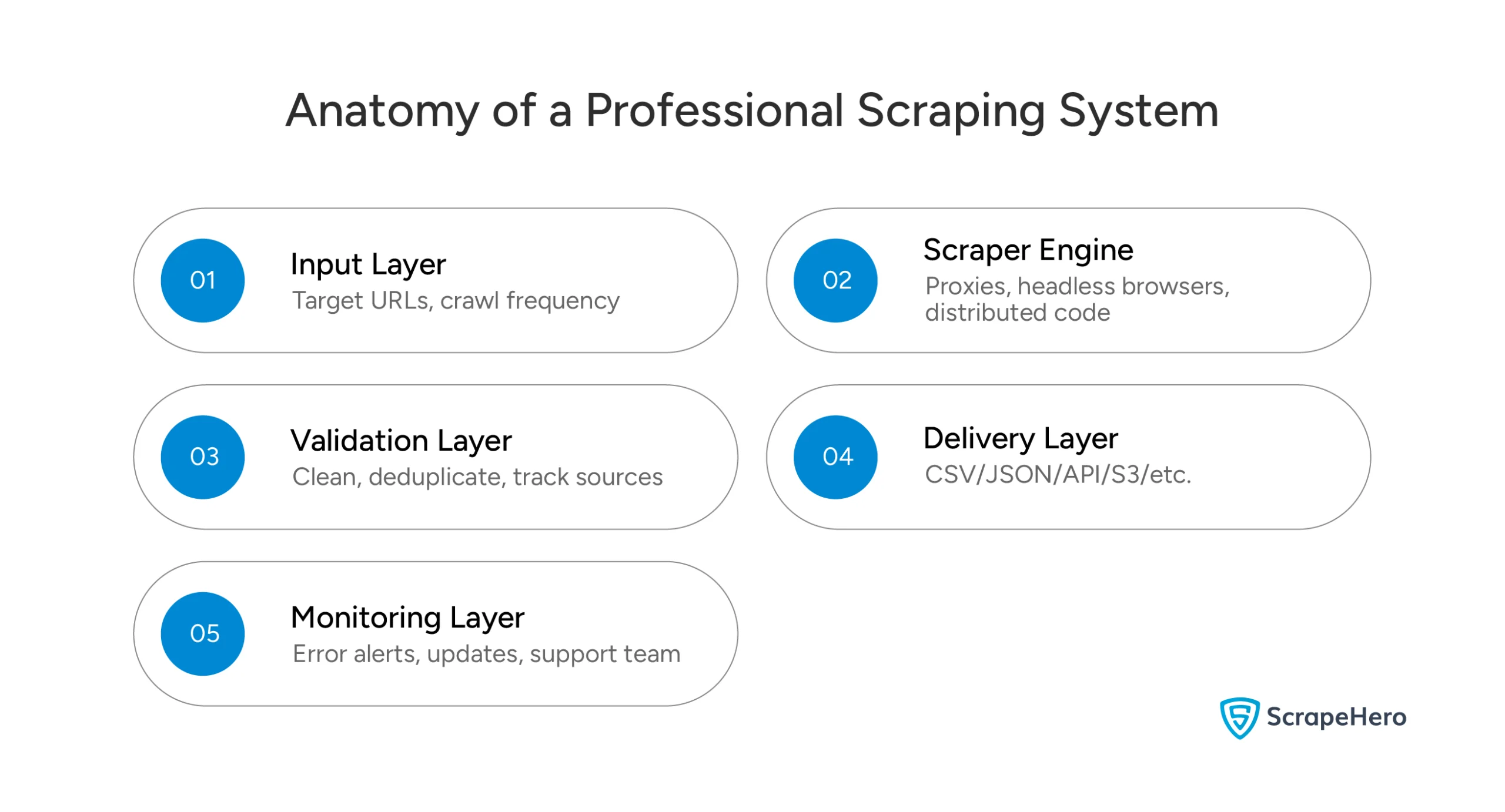
Q6: In What Formats Can You Deliver Data, and What Are Your Delivery Mechanisms?
Why This Question is Crucial
Data is only helpful if it fits into your existing systems. Otherwise, the wrong format or delivery method can create extra work and delays for your team.
What to Listen For
Flexible providers offer:
- Multiple standard formats (CSV, JSON, XML, etc.)
- Direct database delivery to your systems
- Cloud storage integration (Amazon S3, Google Cloud)
- API access for real-time data queries
- Secure delivery methods appropriate for your data size
Red Flags
Avoid providers who:
- Only offer one delivery format
- Use manual, insecure delivery methods
- Don’t understand modern cloud services
- Charge excessive fees for standard formats
Q7: What Does Your Support and Communication Model Look Like?
Why This Question is Crucial
Let’s face it, when issues arise, you need fast, knowledgeable help. Poor communication and support can turn minor problems into major business disruptions.
What to Listen For
Customer-focused providers offer:
- Dedicated account managers for your project
- Multiple communication channels (email, phone, chat)
- Clear response time commitments
- Regular project updates, even when things are going well
- Direct access to technical experts when needed
Red Flags
Be wary of providers with:
- Only generic email support
- Vague promises about responsiveness
- Poor communication during the sales process
- Basic support is an expensive add-on
Q8: Can You Provide a Detailed Breakdown of Your Pricing Model?
Why This Question is Crucial
Hidden costs and complex pricing can destroy your budget. So, you need transparent, predictable pricing that aligns with the value you receive.
What to Listen For
Transparent providers will explain:
- Clear pricing models (subscription, pay-per-record, custom)
- All potential costs upfront (setup, maintenance, data volume)
- Detailed breakdown of complex projects
- Fair pricing for changes and updates
- What happens if you exceed limits
Red Flags
Avoid providers who:
- Can’t explain their pricing clearly
- Offer suspiciously low prices
- Use complex formulas you can’t understand
- Hide common costs like maintenance fees
Q9: What Are the Terms of Your SLA and Data Ownership Clauses?
Why This Question is Crucial
Contracts protect both parties and set clear expectations. In particular, strong SLAs guarantee service quality, while data ownership clauses ensure you control the data you pay for.
What to Listen For
Professional providers offer:
- Specific, measurable service guarantees
- Clear penalties if they don’t meet commitments
- Unambiguous data ownership rights for clients
- Strong confidentiality and security protections
- Fair termination terms
Red Flags
Be concerned about providers who:
- Don’t offer formal SLAs
- Use vague language about service quality
- Want to retain rights to your data
- Won’t negotiate any contract terms
- Require long-term commitments with no exit options
Q10: Can You Provide Case Studies, References, or a Pilot Project?
Why This Question is Crucial
Anyone can make claims about their services. That’s why this is one of the top 10 questions to ask a web scraping service provider: ask for proof of their skills. You should request real examples and results.
What to Listen For
Confident providers will offer:
- Detailed case studies from similar projects
- References from current satisfied clients
- Pilot projects to prove their capabilities
- Clear examples of their expertise in your industry
- Willingness to demonstrate their work quality
Red Flags
Avoid providers who:
- Have no relevant experience in your industry
- Refuse to provide any client references
- Can’t show samples of their work quality
- Won’t consider pilot projects for large commitments
From Interrogation to Partnership
These questions on web scraping help transform you from a passive buyer into an informed decision-maker. Top providers appreciate detailed questions. In fact, they see it as a sign that you care about quality and partnership.
Use these 10 questions to assess providers in key areas:
- Technical expertise
- Legal compliance
- Data quality
- Operational reliability
- Customer service
The right provider won’t just deliver data. Instead, they’ll become a strategic partner in your business growth.
Remember, choosing a web scraping service provider is a strategic decision. You’re giving them the raw materials that will define your business intelligence and competitive edge. Take time to ask the top 10 questions to ask a web scraping service provider and pick the right partner.
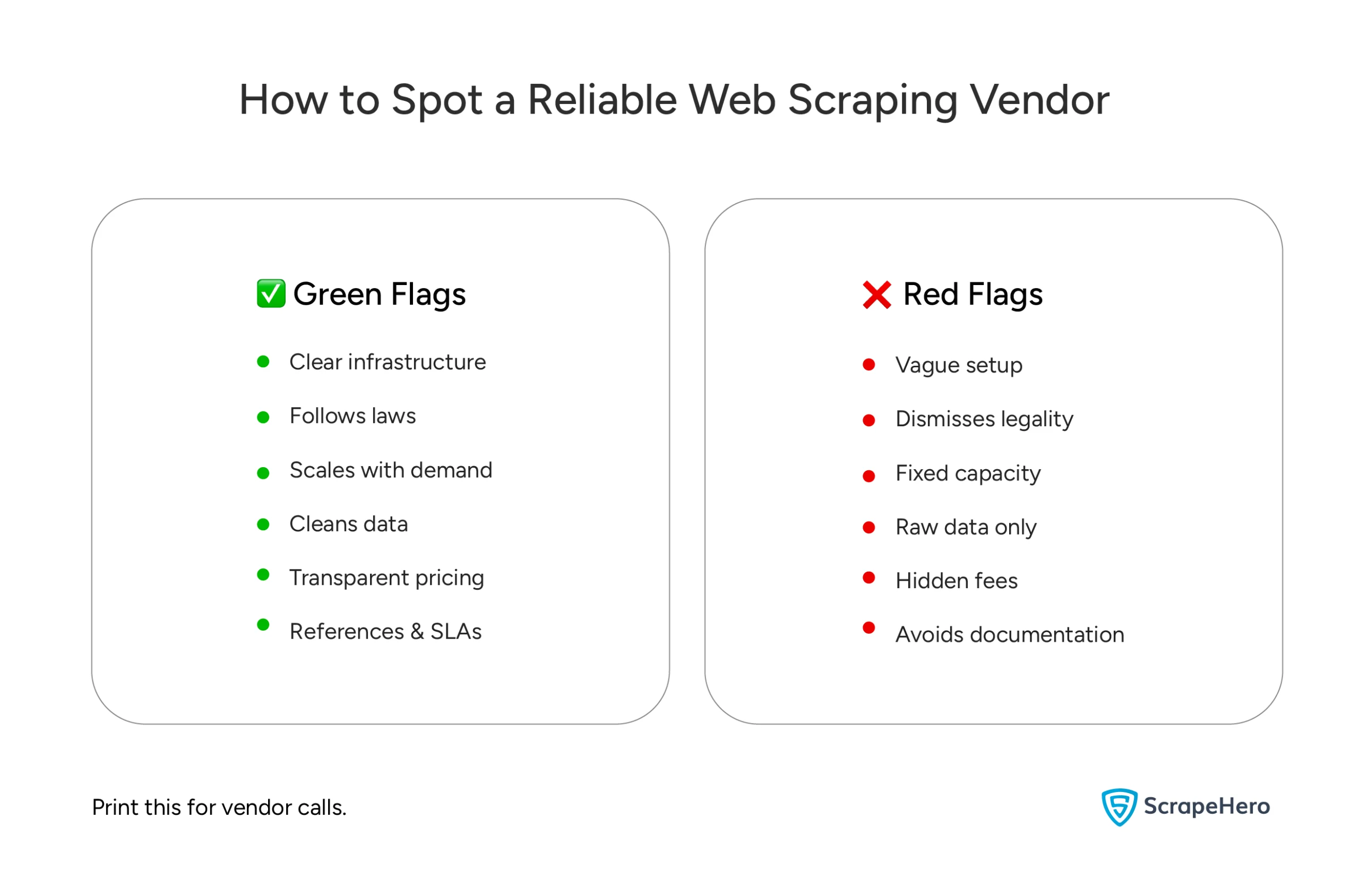
ScrapeHero’s Web Scraping Service
ScrapeHero answers all these crucial questions with confidence. ScrapeHero is a fully managed web scraping service. We handle everything from data extraction to delivery. So, you get the data in ready-to-use formats.
ScrapeHero uses strong tech systems, follows laws closely, ensures quality, and offers excellent customer support. This helps mid-sized companies and enterprises turn web data into competitive advantages.
Our transparent pricing, strong SLAs, and proven track record in many industries make us the best choice for your data extraction needs.
So connect with our expert today to find out how our web scraping services can fuel your business growth with reliable, high-quality data solutions.
Frequently Asked Questions
Before scraping a website, do the following:
1. Check the robots.txt file.
2. Review the terms of service.
3. Make sure the data is publicly available.
4. Verify compliance with data privacy laws.
5. Assess the website’s anti-scraping measures.
6. Always respect rate limits and scrape responsibly.
Key ethical concerns are:
1. Respecting robots.txt files.
2. Not overloading servers with requests.
3. Protecting personal data as privacy laws require.
4. Following the terms of service.
5. Using scraped data responsibly to avoid harming individuals or businesses.
Check pricing by asking for detailed cost breakdowns. Compare different models, such as subscription and pay-per-record. Understand what’s included in the base price. Look for hidden fees and make sure pricing scales well with your data volume needs.
Check on these topics:
1. Available formats: CSV, JSON, XML, etc
2. Delivery methods: API, cloud storage, direct database
3. Integration with your current systems
4. How often do data updates happen
5. Security for data transfer
6. Extra costs for formats or delivery methods
Check their technical skills by asking about:
1. Infrastructure architecture
2. Proxy management systems
3. JavaScript rendering capabilities
4. Scalability options
5. Monitoring and maintenance processes
6. Experience with similar websites
7. Request technical documentation and references from similar projects.

